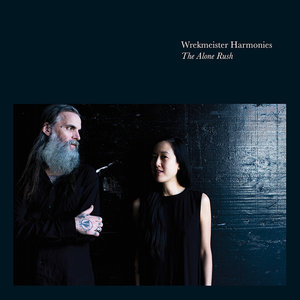Wrekmeister Harmonies: The Alone Rush (Thrill Jockey)
Experimental American post-rock outfit deliver a monumental set for their fifth album
Released Apr 12th, 2018 via Thrill Jockey / By Erick Mertz
 J.R. Robinson creates art out of ash and human wreckage. Each time I returned to the desk to re-write that sentence, my task was to isolate and ponder a single word’s meaning. Ash. Human. Wreckage. Never art though. No, never the word art. Wrekmeister Harmonies’ latest album, The Alone Rush is a work of art.
J.R. Robinson creates art out of ash and human wreckage. Each time I returned to the desk to re-write that sentence, my task was to isolate and ponder a single word’s meaning. Ash. Human. Wreckage. Never art though. No, never the word art. Wrekmeister Harmonies’ latest album, The Alone Rush is a work of art.Whether J.R. Robinson is singing about solitude, hailing the loss of a loved one, describing a three-century old murder or pondering the concept of blindness, he is an elegant, haunting and otherwise chilling storyteller. On the band’s previous record, Light Falls, a Holocaust concept piece, Wrekmeister Harmonies presented a morbid testament to humanity’s dark side, and while the tribute feels as prominent here, it has been somewhat inverted. Robinson and his primary cohort, Esther Shaw are drilling down into personal experiences of loss rather than reach into a fetid, smoke filled sky.
The opening track 300 Year Old Slit Throat stirs the dusky atmosphere into life. The guitars are faint and echoed, and a singular, almost strangled string carries on for ten wrenching minutes. That bleeds into Descent Into Blindness a song that centers on the refrain, 'leave the light on' and evokes doom as much as anything I have heard in some time. On repeat listens, it seems as though the blindness Robinson characterizes is one of curse, or a pox thrust upon an innocent. The Alone Rush ends up a relatively quiet listen, more concise and measured than bombastic. It isn’t until the album is lurching toward its finish that it explodes, in the middle of, Forgive Yourself And Let Go a 14-minute track that collapses and disintegrates into a noisy soundscape. Yet, for the brevity in the album’s experimentation with noise, it casts a shadow front and back.
Shaw and Robinson recorded this record differently than their previous work. They wanted bring forth a sense of healing and intimacy. So, rather than record in Chicago, they uprooted and moved to the relatively isolated Oregon beach town of Astoria and laid down the tracks in what the bandleader described as a cult-like atmosphere. The instrumental analogs for Wrekmeister Harmonies can be difficult to draw. I don’t really think that anyone goes into one of the band’s records because it 'sounds like' or suggests something else. On one hand their gritty sense of mysticism harkens to Swans (with whom they share a drummer, Thor Harris) while a few times the swarthy baritone brings me to a Mark Kozelek place, if only for a similar vocal singularity.
Whether those are accurate, or if anyone else hears them on The Alone Rush, doesn’t really matter. Wrekmeister Harmonies craft a uniquely affecting brand of art and the mark on your soul is not – cannot be – the same as the one left on anyone else. 5/5





 All Content RSS Feed
All Content RSS Feed
Follow Bearded on...